What drives a business forward, ensures steady growth, and builds lasting customer relationships? The answer is sales. In today’s competitive market, sales have evolved far beyond traditional door-to-door pitches or simple product demonstrations.
It’s now a dynamic blend of strategy, customer understanding, and data-driven insights that fuels successful businesses. For companies looking to thrive in 2024, mastering modern sales techniques, digital tools, and customer-centric approaches is key.
Sales are at the heart of every thriving organization, influencing everything from revenue generation to brand reputation. Today’s sales professionals don’t just push products; they serve as trusted advisors who listen to and solve customer needs.
This shift has transformed sales into a sophisticated process that requires careful planning, thorough understanding of customer behavior, and integration of digital tools. Salespeople in 2024 must blend analytical skills with empathy, adapting quickly to emerging trends and customer expectations.
The rise of technology in sales has introduced a wide range of tools that streamline processes, personalize interactions, and track performance in real-time. Advanced customer relationship management (CRM) systems, automation, and artificial intelligence are changing how sales teams work, allowing for more efficient lead management, predictive insights, and targeted outreach. Leveraging these tools enables businesses to achieve higher conversion rates and build stronger customer loyalty.
Deskera ERP plays a valuable role in supporting modern sales teams by centralizing data and automating workflows across departments, including sales, inventory, and finance.
By providing real-time insights into inventory levels, customer data, and sales performance, Deskera ERP empowers businesses to make informed decisions, enhance customer experience, and drive growth with agility.
As sales continue to evolve, Deskera ERP stands as an essential tool for companies looking to stay competitive in an ever-changing market.
What is Sales?
Sales is the process of exchanging a product or service for compensation, typically involving the steps to engage, persuade, and close transactions with potential buyers. At its core, sales is about understanding the needs of customers, effectively communicating the value of a product or service, and building relationships that encourage trust and loyalty.
In business, sales play a critical role as the primary driver of revenue and customer acquisition. Sales activities range from initial outreach and lead generation to negotiations and finalizing deals, making it a key function for growing and sustaining a company.
Sales teams are often responsible not only for selling but also for nurturing relationships with customers to encourage repeat business and referrals, making it a continuous and strategic process.
In today's market, sales have evolved to incorporate various methodologies—such as consultative selling, solution selling, and digital sales techniques—that focus on aligning with the specific needs and expectations of customers.
Modern sales processes often leverage technology like CRM systems, automation, and data analytics to enhance efficiency, personalize the customer journey, and optimize outcomes.
Types of Sales
There are several main types of sales, each designed to reach specific types of customers, meet particular needs, and leverage different strategies. Here’s a breakdown of some of the most common types:
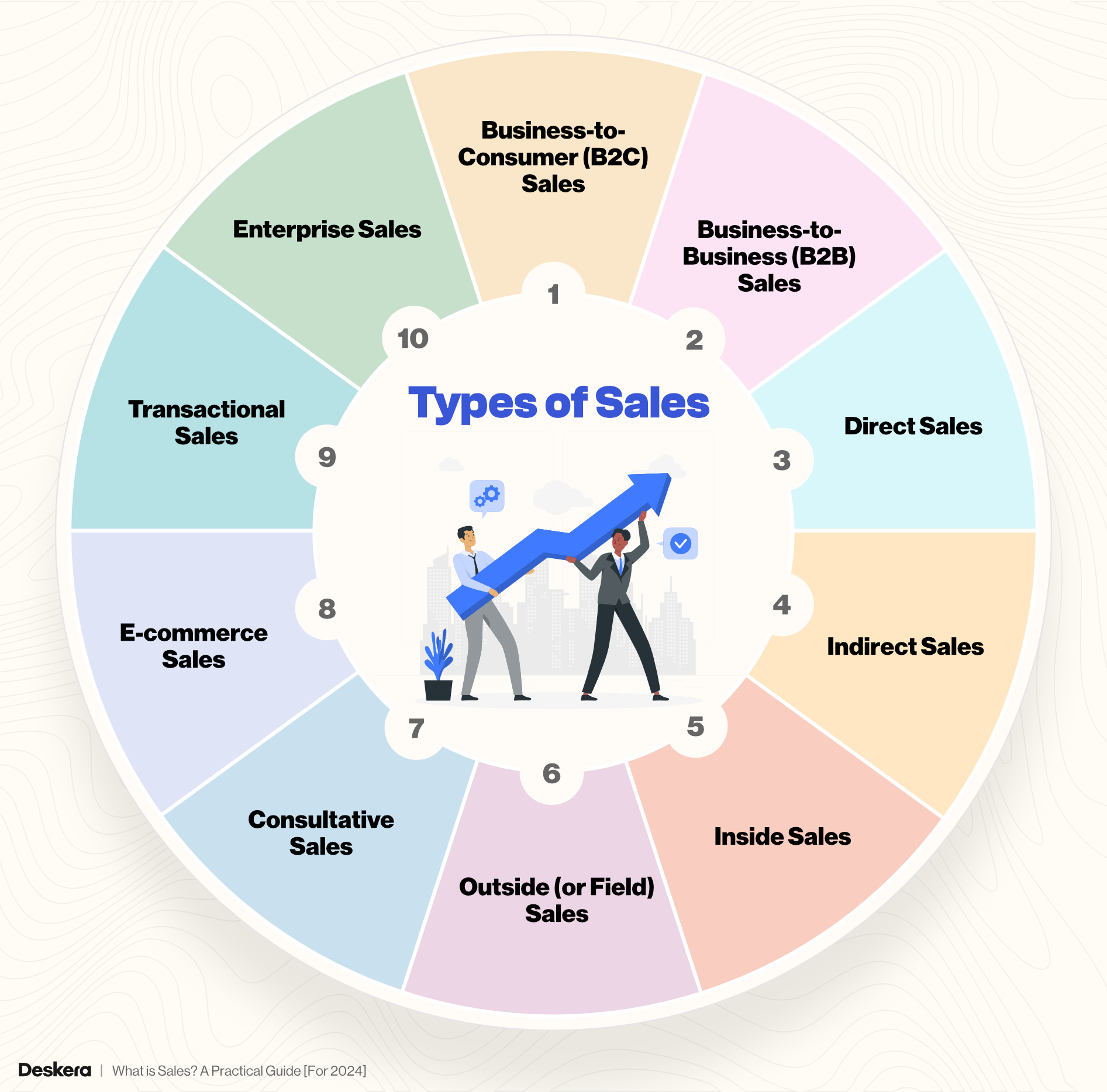
1. Business-to-Consumer (B2C) Sales
- Definition: This type of sale occurs when businesses sell products or services directly to individual consumers.
- Characteristics: B2C sales often involve shorter sales cycles, as consumers typically make purchasing decisions faster than businesses. Examples include retail stores, e-commerce platforms, and direct online sales.
- Approach: Sales strategies focus on emotional appeal, brand engagement, and convenience, with a heavy emphasis on digital marketing and user-friendly purchase experiences.
2. Business-to-Business (B2B) Sales
- Definition: B2B sales involve selling products or services from one business to another.
- Characteristics: B2B sales are generally more complex, with longer sales cycles that often involve multiple decision-makers. Common examples include sales of software, industrial equipment, or raw materials to other companies.
- Approach: B2B sales require relationship-building, in-depth product knowledge, and a consultative approach. Emphasis is placed on return on investment (ROI), efficiency, and scalability.
3. Direct Sales
- Definition: Direct sales are made without intermediaries, where businesses sell directly to customers or clients.
- Characteristics: This type of sales includes face-to-face interactions, such as door-to-door sales or at-home product demonstrations. In a digital context, it can also include direct online sales via company websites.
- Approach: Direct sales rely on building personal connections with customers, often using highly trained sales representatives to deliver a tailored pitch and establish trust.
4. Indirect Sales
- Definition: In indirect sales, companies use third parties, such as resellers, affiliates, or distributors, to sell their products.
- Characteristics: Indirect sales expand a company’s reach by leveraging the networks of intermediaries, often used in industries like consumer electronics or software.
- Approach: Companies focus on partnerships and training third parties to represent their brand, with less direct control over the end customer relationship.
5. Inside Sales
- Definition: Inside sales occur remotely, with sales representatives typically working from an office or home to engage with customers through phone, email, or virtual meetings.
- Characteristics: Inside sales have become increasingly popular with the rise of digital sales tools, allowing companies to reach a large audience without face-to-face interactions.
- Approach: Sales reps use tools like CRM software and automation to nurture leads, schedule follow-ups, and track the sales process, focusing on efficiency and scalability.
6. Outside (or Field) Sales
- Definition: Outside sales involve sales representatives meeting clients in person, either at the customer’s location or at events.
- Characteristics: These sales are often used for high-value or complex products that require in-depth demonstrations or a consultative approach.
- Approach: Outside sales reps build relationships through face-to-face meetings, often offering personalized, hands-on experiences.
7. Consultative Sales
- Definition: This approach focuses on understanding and solving a customer’s unique challenges rather than simply selling a product.
- Characteristics: Consultative sales are commonly used in industries like software, technology, and financial services.
- Approach: Sales representatives act as advisors, taking time to understand the customer’s pain points and providing tailored solutions, often resulting in longer-lasting customer relationships.
8. E-commerce Sales
- Definition: E-commerce sales are transactions conducted online through websites, apps, or social media.
- Characteristics: E-commerce sales are convenient, accessible, and often include self-service options, allowing customers to browse, purchase, and track orders independently.
- Approach: Businesses optimize online sales channels with user-friendly interfaces, personalized recommendations, and seamless payment options to enhance the shopping experience.
9. Transactional Sales
- Definition: Transactional sales involve straightforward purchases with minimal interaction, usually for lower-priced or commodity items.
- Characteristics: These sales are often quick and rely on high volume rather than deep customer relationships, as seen in retail stores or online marketplaces.
- Approach: The focus is on efficiency, ease of purchase, and a streamlined buying process, often driven by discounts, promotions, and quick checkout options.
10. Enterprise Sales
- Definition: Enterprise sales, also known as complex sales, involve large-scale transactions with lengthy sales cycles and multiple stakeholders.
- Characteristics: Common in industries like technology, finance, and manufacturing, these sales require strategic planning, detailed proposals, and in-depth negotiations.
- Approach: Sales teams focus on relationship-building, providing personalized solutions, and offering demonstrations to secure contracts with large organizations.
Each type of sale requires a different approach and skill set, as well as unique tools and technologies to support the sales process effectively.
The Sales Process: Step-by-Step Guide to Closing Deals
The sales process is a structured journey that guides sales teams from initial contact with a prospect to the successful closing of a deal. This process involves several key stages, each of which plays a critical role in moving potential customers from awareness to decision.
Here’s an overview of the main stages in a typical sales process:
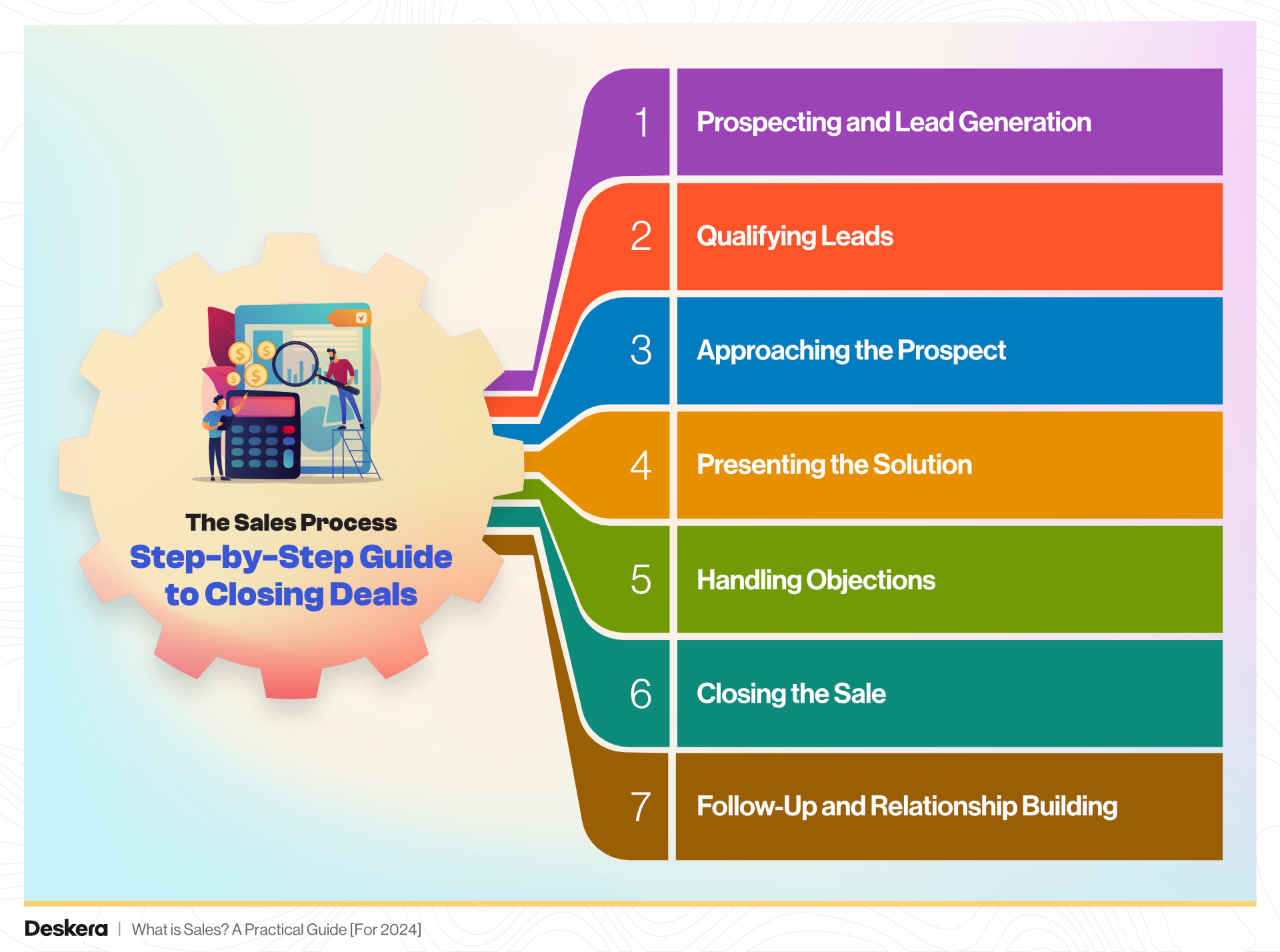
Prospecting and Lead Generation
The process begins with identifying potential customers, known as prospects, who may have an interest in the product or service. This stage often involves researching the target market and using methods like cold calling, networking, social media outreach, and inbound marketing to attract leads.
Qualifying Leads
Not every lead is a good fit for the product or service, so sales teams need to qualify leads by assessing their potential. This stage focuses on identifying whether a prospect has the need, interest, and resources to make a purchase, often by asking targeted questions to understand their pain points and budget.
Approaching the Prospect
Once leads are qualified, sales representatives engage with them, either through an introductory call, email, or meeting. This stage is about building rapport, presenting the company’s value proposition, and establishing trust to move the conversation forward.
Presenting the Solution
In this stage, sales reps present the product or service, highlighting how it addresses the prospect’s specific needs and adds value. This may include a demonstration, personalized proposal, or product demo to illustrate benefits and differentiate the offering from competitors.
Handling Objections
Prospects often have questions or concerns about the product, price, or implementation. The objection-handling stage is critical, as it gives the sales rep an opportunity to address doubts, clarify misunderstandings, and provide additional information to reassure the prospect.
Closing the Sale
This is the stage where the sales rep asks for the sale. It may involve negotiating terms, offering a discount, or finalizing the agreement. Successful closing techniques focus on creating a sense of urgency or emphasizing the solution’s value to encourage the prospect to commit.
Follow-Up and Relationship Building
The sales process doesn’t end with a closed deal. Follow-up is essential for maintaining the customer relationship, ensuring satisfaction, and opening doors for future sales or referrals. Regular check-ins and customer support help build long-term loyalty.
By following these stages, sales teams can create a repeatable process that increases efficiency, improves customer satisfaction, and drives consistent revenue growth.
Modern Sales Techniques and Strategies for 2024
Sales in 2024 is more than just pitching products; it’s a nuanced, customer-centric approach powered by technology, insights, and value-driven interactions. To stay competitive, sales professionals need to adopt modern techniques that emphasize personalization, relationship-building, and the smart use of data.
Here’s a look at some key sales strategies and techniques leading the way in 2024:
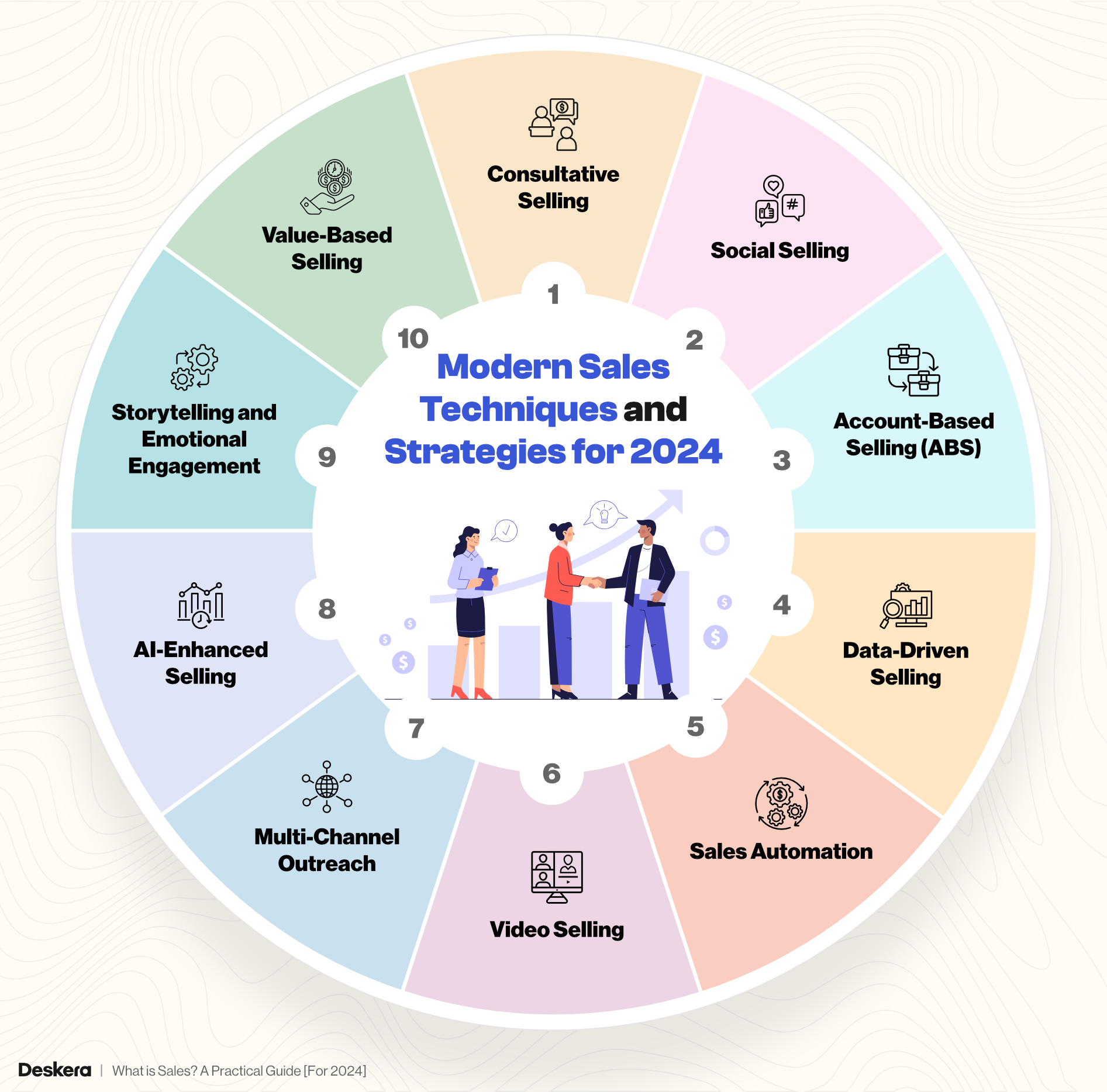
Consultative Selling
- Overview: Consultative selling, also known as solution selling, focuses on understanding the customer’s unique needs and challenges to offer tailored solutions rather than generic product pitches.
- Why It Matters: By acting as a trusted advisor, sales reps build deeper relationships and increase the likelihood of closing deals with customers who feel understood and valued.
- How to Implement: Ask open-ended questions to uncover customer pain points, offer customized solutions, and show genuine interest in helping solve the customer’s problems rather than just making a sale.
Social Selling
- Overview: Social selling involves using social media platforms to engage with prospects, build relationships, and provide value through content, insights, and personalized interactions.
- Why It Matters: Social media allows sales teams to reach prospects where they already spend time and enables ongoing engagement without the pressure of direct selling.
- How to Implement: Sales reps can share relevant content, respond to comments, engage in industry conversations, and use LinkedIn or other platforms to establish a presence as industry experts.
Account-Based Selling (ABS)
- Overview: Account-based selling targets specific high-value accounts with a highly personalized approach, often involving coordinated efforts across marketing and sales teams.
- Why It Matters: ABS focuses on quality over quantity, allowing teams to concentrate resources on the most promising leads and deliver customized experiences that are hard to ignore.
- How to Implement: Identify high-potential accounts, research their specific needs, and develop tailored strategies, such as personalized content and messaging, to engage decision-makers within those companies.
Data-Driven Selling
- Overview: Data-driven selling leverages data analytics to guide decisions, predict customer behavior, and identify patterns that increase sales effectiveness.
- Why It Matters: Data offers insights that enable sales teams to understand which prospects are most likely to convert, optimize timing, and personalize communication.
- How to Implement: Use CRM tools and analytics to monitor customer interactions, track lead scores, and leverage insights like buying trends and response rates to inform outreach and follow-up timing.
Sales Automation
- Overview: Automation tools streamline repetitive tasks, such as follow-up emails, lead scoring, and scheduling, allowing sales reps to focus more on high-value activities.
- Why It Matters: Sales automation boosts productivity and enables a more efficient sales process, ensuring no leads are overlooked and that follow-ups happen consistently.
- How to Implement: Invest in sales automation software like CRM platforms, automated email sequences, and lead nurturing tools to keep the sales funnel moving smoothly.
Video Selling
- Overview: Video selling uses video messages or calls to connect with prospects in a more personal and engaging way.
- Why It Matters: Video allows for a face-to-face interaction that builds trust and helps personalize the sales process, especially in remote selling environments.
- How to Implement: Sales reps can record short video introductions, product demos, or personalized follow-ups to create memorable touchpoints that stand out from text-based communication.
Multi-Channel Outreach
- Overview: This approach uses a variety of channels—such as email, social media, phone calls, and direct messaging—to reach prospects in multiple ways.
- Why It Matters: Multi-channel outreach increases the chances of reaching prospects on their preferred platforms, creating a more accessible and flexible experience for customers.
- How to Implement: Develop a strategy that incorporates multiple touchpoints and synchronizes messaging across email, social media, calls, and other channels, ensuring consistency in your value proposition.
AI-Enhanced Selling
- Overview: AI tools are becoming integral to sales processes, from predictive analytics to chatbots that handle initial customer inquiries.
- Why It Matters: AI enables data-driven predictions, 24/7 customer engagement, and deeper insights into customer preferences, making sales teams more effective and responsive.
- How to Implement: Integrate AI-driven CRM tools that offer predictive insights, utilize chatbots for customer service, and apply AI to analyze customer data and improve lead scoring accuracy.
Storytelling and Emotional Engagement
- Overview: Storytelling involves framing the sales pitch around a narrative that resonates emotionally with customers, focusing on benefits rather than features.
- Why It Matters: Stories are memorable, create emotional connections, and make complex information more relatable, which can influence buying decisions.
- How to Implement: Train sales reps to craft a compelling story about the product or service, focusing on customer success stories, real-life examples, or how the product solves a particular challenge.
Value-Based Selling
- Overview: Value-based selling emphasizes the value or benefits a product provides rather than its features or price.
- Why It Matters: By focusing on how the product solves problems or creates opportunities, value-based selling helps prospects understand the return on their investment, making it easier to justify the purchase.
- How to Implement: Encourage sales teams to focus conversations on the specific benefits that matter most to each customer, such as cost savings, productivity gains, or long-term efficiency.
These modern sales techniques are helping businesses adapt to a more customer-centric market and thrive in an increasingly competitive landscape. By integrating these strategies into their approach, sales teams can create more meaningful connections, enhance customer experience, and drive sustainable success in 2024.
The Role of Technology in Transforming Modern Sales
Technology has become an integral driver of change in the sales landscape, enabling sales teams to work more efficiently, reach prospects effectively, and provide better customer experiences.
From automating repetitive tasks to analyzing customer data for insights, technology is reshaping how companies approach selling in today’s fast-paced market.
Here are some ways technology is enhancing the sales process and empowering sales teams:
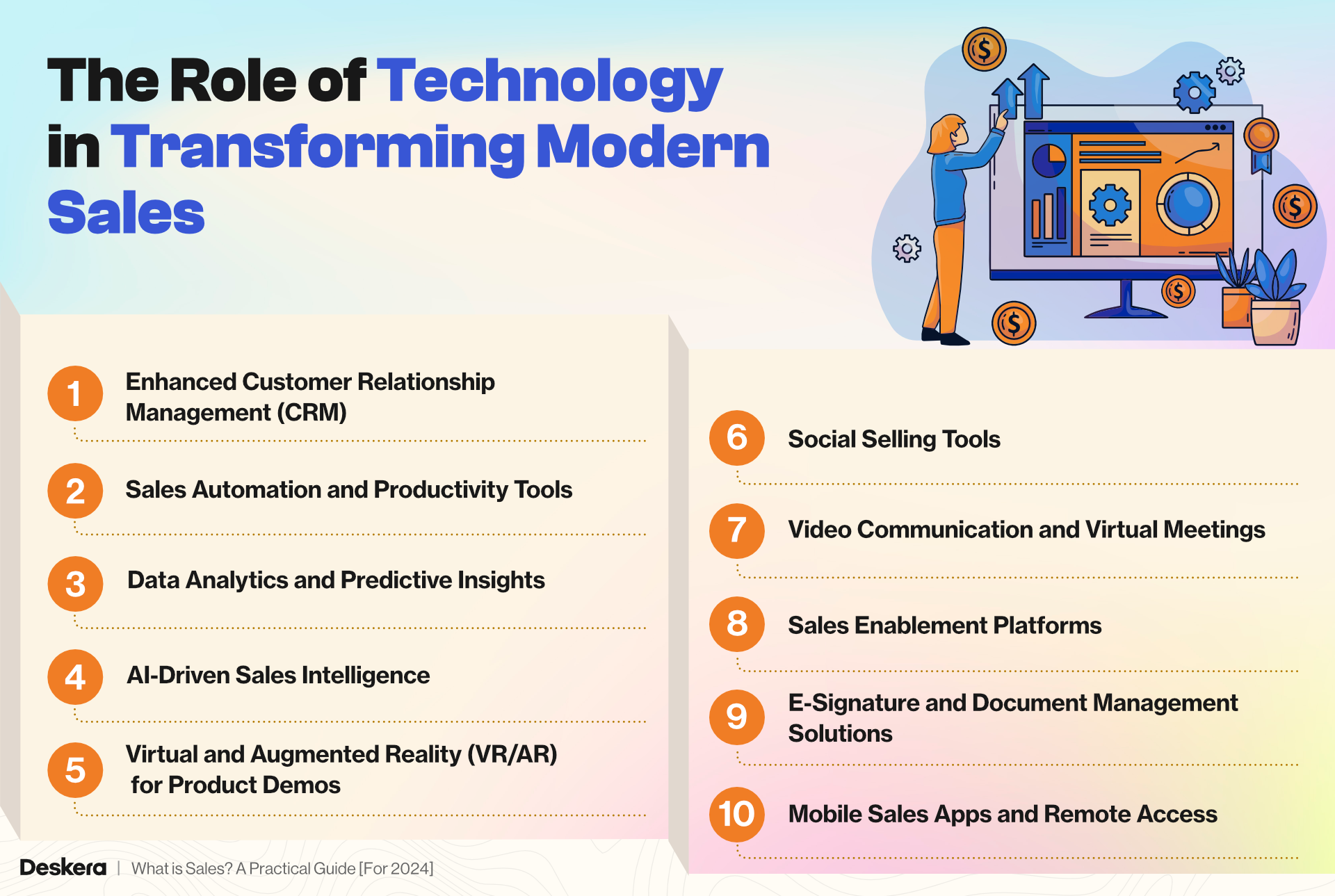
Enhanced Customer Relationship Management (CRM)
- Overview: CRM platforms like Deskera ERP have transformed customer data management, allowing sales teams to track customer interactions, monitor buying behavior, and nurture relationships over time.
- Impact: With a centralized view of each customer, sales representatives can provide a more personalized experience, follow up promptly, and increase customer retention. CRM systems also offer analytics to identify sales patterns and prioritize leads.
Sales Automation and Productivity Tools
- Overview: Automation tools handle time-consuming tasks such as sending follow-up emails, scheduling meetings, lead scoring, and tracking engagement.
- Impact: Automation frees up sales reps to focus on building relationships, qualifying leads, and closing deals. Tools like email automation, task reminders, and follow-up prompts increase productivity and ensure no sales opportunity is missed.
Data Analytics and Predictive Insights
- Overview: Data analytics tools analyze customer and market data to provide actionable insights, helping sales teams anticipate customer needs, predict buying behavior, and identify potential high-value accounts.
- Impact: By leveraging predictive analytics, sales teams can target the right prospects, tailor pitches, and engage with leads who are more likely to convert. This data-driven approach improves the efficiency of outreach efforts and leads to higher conversion rates.
AI-Driven Sales Intelligence
- Overview: AI-powered tools assist with lead generation, sales forecasting, and even automated outreach. AI can analyze past sales data to recommend the best time to contact leads or suggest products based on customer preferences.
- Impact: AI takes much of the guesswork out of selling by offering insights that help sales teams make smarter, more informed decisions. It can also handle routine tasks, such as qualifying leads, allowing sales reps to focus on more complex interactions.
Virtual and Augmented Reality (VR/AR) for Product Demos
- Overview: VR and AR technology enable immersive product demonstrations, giving prospects a realistic sense of the product’s capabilities in a virtual environment.
- Impact: For industries like real estate, automotive, and manufacturing, VR and AR can be invaluable in showcasing product features in a lifelike way. This technology helps engage prospects on a deeper level, especially in remote or international sales scenarios.
Social Selling Tools
- Overview: It helps sales teams engage with prospects on social media, monitor conversations, and share relevant content to nurture relationships.
- Impact: Social selling enables sales reps to reach prospects where they are already active, building brand awareness and trust without pushing a hard sell. This technique is particularly useful for creating a pipeline of warm leads who are more receptive to outreach.
Video Communication and Virtual Meetings
- Overview: With video conferencing tools like Zoom, Microsoft Teams, and Loom, sales teams can hold virtual meetings, send video messages, and conduct personalized product demos remotely.
- Impact: Video allows for face-to-face interactions that build rapport and trust, even in a virtual environment. Video messages and demos help humanize the sales process and provide a more personalized experience, especially in remote or hybrid work settings.
Sales Enablement Platforms
- Overview: Sales enablement platforms provide tools and resources to help sales teams access content, training, and customer insights in one place.
- Impact: Sales enablement tools ensure that reps have the right information at the right time, making it easier to address customer concerns, answer questions, and close deals. They also support ongoing training, allowing sales teams to stay updated on new techniques and product knowledge.
E-Signature and Document Management Solutions
- Overview: E-signature solutions streamline the contract signing process, allowing for quick and secure electronic signatures.
- Impact: By digitizing the signing process, e-signature tools reduce paperwork, speed up deal closure, and create a seamless experience for clients. Document management tools also allow teams to share and access important files on the go, improving flexibility and response times.
Mobile Sales Apps and Remote Access
- Overview: Mobile sales apps enable reps to access CRM data, communicate with leads, and close deals on the go.
- Impact: With mobile access, sales teams can work more flexibly and respond to leads promptly, even while away from their desks. This accessibility is especially valuable for field sales teams who need real-time data and communication options on the road.
Technology in sales is essential for staying competitive in today’s digital marketplace, empowering sales teams to work smarter, deliver faster responses, and create more tailored customer experiences. By leveraging these technologies, businesses can enhance every stage of the sales process, from lead generation to closing, while building stronger and more efficient sales operations.
Building an Effective Sales Funnel
A sales funnel is a structured journey that leads take from the initial point of contact with a brand to the final purchase decision. Crafting an effective sales funnel requires a clear understanding of the buyer's journey and an approach tailored to meet potential customers’ needs at each stage.
Here’s a step-by-step guide to building a sales funnel that engages prospects, builds trust, and maximizes conversions.
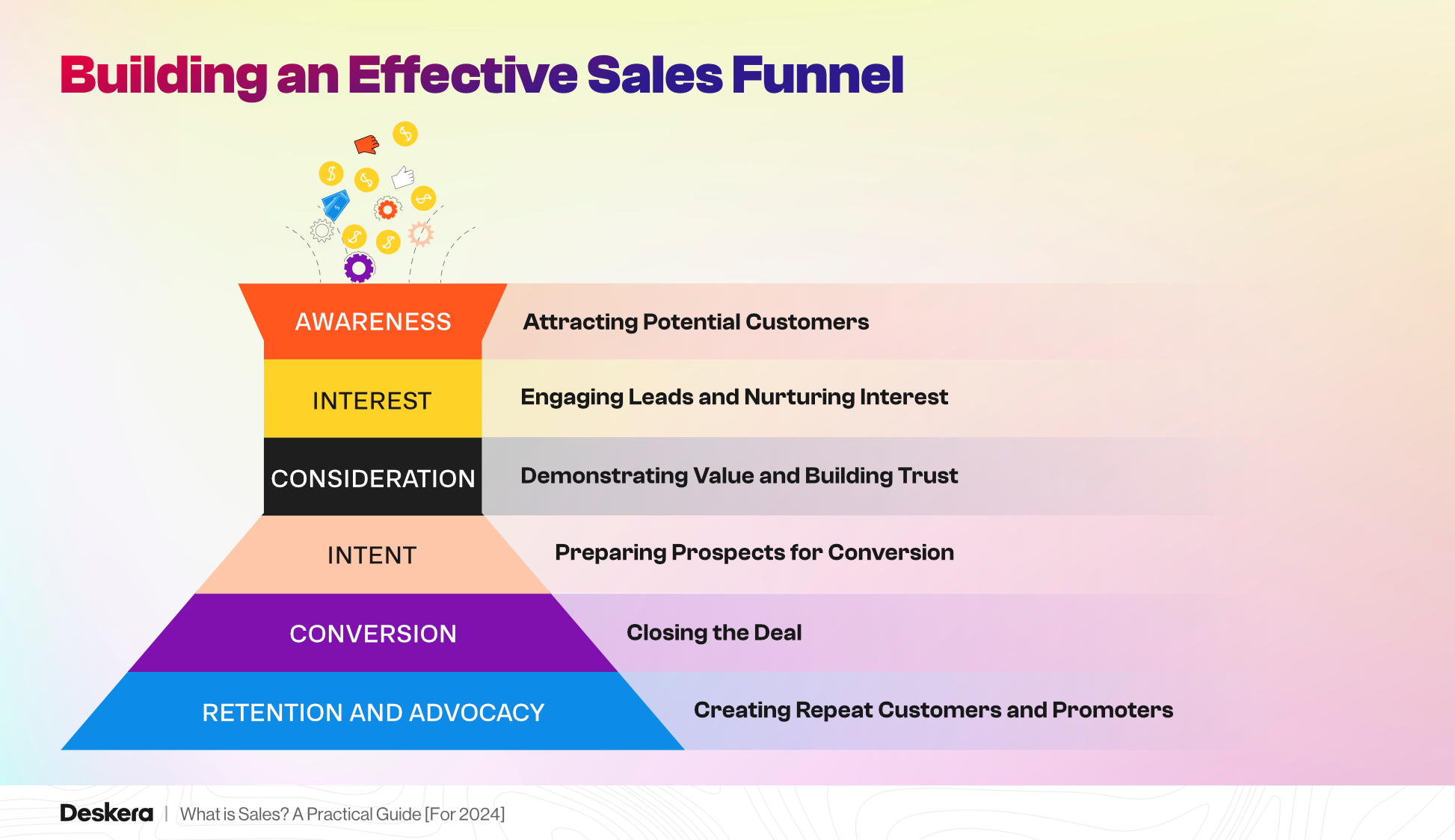
Awareness: Attracting Potential Customers
- Objective: Generate interest and make potential customers aware of your product or service.
- Strategies: Content marketing, social media outreach, paid ads, and search engine optimization (SEO) are effective for capturing attention at this stage. Content like blogs, videos, and social media posts should be educational, providing value and positioning your brand as a trusted resource.
- Tip: Focus on creating content that addresses common challenges or questions your target audience may have, which will help attract quality leads into the funnel.
Interest: Engaging Leads and Nurturing Interest
- Objective: Keep prospects engaged and encourage them to explore your offerings.
- Strategies: Use email marketing, webinars, downloadable resources, and informative newsletters to deliver relevant information. Personalized content helps potential customers better understand how your product can meet their needs, building interest in your solutions.
- Tip: Offer gated content (such as an eBook or case study) that provides insights into specific pain points in exchange for contact information. This approach helps qualify leads and collect details for ongoing engagement.
Consideration: Demonstrating Value and Building Trust
- Objective: Address the specific needs of interested leads, showcasing how your product or service stands out.
- Strategies: Case studies, product demos, testimonials, and comparison guides are effective tools at this stage. Consider offering free trials, personalized demos, or consultations that let prospects experience the benefits firsthand.
- Tip: Highlight key differentiators and real-life success stories to help prospects see why your product or service is the best solution for their challenges.
Intent: Preparing Prospects for Conversion
- Objective: Confirm that your product or service is the right choice and remove any final objections.
- Strategies: Special offers, limited-time discounts, and personalized outreach can help prompt action from leads in the intent stage. For B2B sales, this could involve a final proposal or a clear pricing discussion.
- Tip: At this stage, address any common hesitations or objections that may prevent prospects from converting. Offering live Q&A sessions or dedicated support can help answer lingering questions.
Conversion: Closing the Deal
- Objective: Move leads from intent to action by completing the sale.
- Strategies: Streamline the purchase process, offer a clear call-to-action (CTA), and use e-signature tools if contracts are required. Ensuring a seamless and intuitive checkout experience is key for B2C sales.
- Tip: Follow up immediately after the sale to thank customers, confirm their decision, and provide onboarding materials to ensure a smooth post-purchase experience. This follow-up helps build loyalty and increases the chances of repeat purchases.
Retention and Advocacy: Creating Repeat Customers and Promoters
- Objective: Turn customers into repeat buyers and advocates for your brand.
- Strategies: Post-purchase engagement is crucial—use email campaigns, loyalty programs, surveys, and customer success check-ins to keep customers engaged and satisfied. A great post-sale experience encourages word-of-mouth referrals and positive online reviews.
- Tip: Request feedback to refine your process, and create opportunities for customers to share their experiences, such as testimonials or case studies. Customer advocacy can bring new leads into the funnel, creating a self-sustaining sales cycle.
By building an effective sales funnel that aligns with the buyer’s journey, companies can guide prospects from awareness to conversion more smoothly. Each stage is an opportunity to demonstrate value, build trust, and deepen relationships, helping transform leads into loyal, long-term customers.
Key Skills for Sales Success in 2024: Adapting to a Dynamic Marketplace
The sales field is continually evolving, with technology, data-driven insights, and customer expectations pushing sales professionals to refine their skill sets. To succeed in 2024, sales teams must possess a blend of traditional people skills and modern tech-savvy capabilities that help them engage prospects in meaningful, personalized ways.
Here are the critical skills needed for sales success in 2024:
Digital Literacy and Tech Proficiency
- Why It Matters: With advanced CRM tools, AI-driven analytics, and virtual sales platforms becoming industry standards, digital literacy is a must-have skill. Sales professionals need to be comfortable using these tools to automate tasks, gain insights, and provide a seamless experience for clients.
- Application: Knowing how to leverage platforms like Salesforce, LinkedIn Sales Navigator, and video conferencing tools enables sales reps to engage effectively with prospects and analyze data to make strategic decisions.
Data-Driven Decision Making
- Why It Matters: Data is a powerful asset in understanding customer behavior, preferences, and pain points. Sales reps who can interpret data insights are better equipped to tailor their pitches, prioritize leads, and forecast sales.
- Application: Using analytics tools, salespeople can analyze customer engagement patterns, identify high-potential leads, and make data-backed decisions that improve conversion rates and enhance customer satisfaction.
Emotional Intelligence and Empathy
- Why It Matters: Sales remain a people-centric field, and emotional intelligence is critical in building relationships, understanding customer needs, and managing objections. Empathetic listening and effective communication foster trust, especially in complex sales processes.
- Application: Sales reps can practice active listening to truly understand a prospect’s concerns, showing empathy and demonstrating that they genuinely care about finding the best solution for the customer’s unique challenges.
Adaptability and Resilience
- Why It Matters: Sales is inherently challenging, and staying resilient in the face of rejection or changing market conditions is essential. As new technologies and customer expectations emerge, sales professionals must be willing to adapt their strategies and continuously improve.
- Application: Adaptability involves experimenting with new tools, refining sales techniques, and staying up-to-date with market trends. Resilience ensures sales reps stay motivated, bounce back from setbacks, and remain productive.
Advanced Communication Skills
- Why It Matters: Clear and compelling communication is key to building connections, articulating value propositions, and negotiating effectively. The rise of digital selling requires fluency in multiple communication channels, including email, social media, and video.
- Application: Mastering virtual presentations, crafting concise messages, and maintaining professionalism in online interactions help sales reps convey trust and expertise in remote or hybrid selling environments.
Consultative Selling and Solution-Based Approach
- Why It Matters: Modern customers prefer sellers who act as advisors rather than just pitching products. Sales professionals with consultative skills can ask the right questions, understand the customer’s goals, and recommend solutions that genuinely meet their needs.
- Application: Consultative selling involves diagnosing the client’s problem and demonstrating how your product or service provides a tailored solution. This approach establishes the sales rep as a trusted partner, which is critical for complex sales cycles.
Social Selling
- Why It Matters: Engaging with prospects through social media is increasingly important, as buyers turn to platforms like LinkedIn for research and networking. Sales reps who excel at social selling can create connections, share insights, and build credibility within their industry.
- Application: By sharing valuable content, engaging with prospects’ posts, and building an online presence, salespeople can attract high-quality leads and maintain relationships through non-intrusive engagement on social platforms.
Time Management and Productivity
- Why It Matters: With multiple tools, channels, and tasks demanding attention, time management is essential. Sales professionals need to prioritize tasks efficiently to focus on high-impact activities that move leads through the funnel.
- Application: Effective time management might involve using productivity tools, setting clear daily objectives, and implementing automation for routine tasks. This helps sales reps maximize their productive hours and ensure they are engaging with high-priority leads.
Negotiation and Closing Skills
- Why It Matters: Despite all the prep work in the sales funnel, closing the deal remains a fundamental skill. Strong negotiation skills help sales reps handle objections, justify pricing, and reach a mutually beneficial agreement.
- Application: Effective negotiation involves listening to the customer’s concerns, showing flexibility where possible, and presenting the product’s value convincingly to finalize the sale confidently.
Continuous Learning and Industry Knowledge
- Why It Matters: The best sales professionals are lifelong learners, continuously expanding their knowledge of their industry, products, and trends. As industries evolve, understanding the latest market shifts and technologies can give sales reps a competitive edge.
- Application: Staying informed through training, industry news, and professional development helps salespeople respond more effectively to customer needs and provide updated insights that add value.
Sales success in 2024 will require a balance of technology expertise, empathy, adaptability, and deep industry knowledge. Sales professionals who embrace these skills will not only build stronger customer relationships but also navigate a rapidly changing landscape with confidence and resilience.
Measuring Sales Success: Essential KPIs and Metrics
Understanding sales performance goes beyond just tracking revenue; it requires a thorough analysis of various key performance indicators (KPIs) and metrics that reflect the effectiveness of sales strategies.
By measuring these KPIs, sales teams can identify strengths, address weaknesses, and adjust their approaches to maximize productivity and revenue growth.
Here are some of the most impactful KPIs for assessing sales success in 2024:
Revenue Growth
- Description: Revenue growth tracks the increase in sales over a specific period and indicates overall business expansion.
- Importance: This metric reflects the effectiveness of the sales strategy in increasing revenue over time. It’s a clear signal of growth, profitability, and market demand for products or services.
- Formula: (Current Period Revenue - Previous Period Revenue) / Previous Period Revenue × 100
Sales Cycle Length
- Description: The time it takes to move a lead from initial contact to final conversion.
- Importance: A shorter sales cycle often means a more efficient process, while a longer cycle can indicate bottlenecks or the need for nurturing. It’s a key indicator of the effectiveness of the sales funnel.
- Formula: Total Duration of All Sales Cycles / Number of Closed Deals
Lead Conversion Rate
- Description: The percentage of leads that are converted into customers.
- Importance: This metric reflects the success of the sales process in converting prospects and can highlight areas where lead nurturing or closing tactics may need improvement.
- Formula: (Number of Leads Converted to Sales / Total Number of Leads) × 100
Customer Acquisition Cost (CAC)
- Description: The cost of acquiring a new customer, including expenses on marketing, sales, and lead generation.
- Importance: CAC is critical for measuring profitability and efficiency. A lower CAC is preferable, as it indicates efficient use of resources in acquiring new customers.
- Formula: Total Sales and Marketing Costs / Number of New Customers Acquired
Customer Lifetime Value (CLV)
- Description: The projected revenue a business expects to earn from a single customer over the lifetime of their relationship.
- Importance: CLV helps sales teams focus on retaining high-value customers and maximizing long-term revenue, encouraging a focus on quality customer relationships.
- Formula: Average Purchase Value × Average Purchase Frequency × Customer Lifespan
Quota Attainment
- Description: The percentage of sales reps who meet or exceed their individual sales targets.
- Importance: Quota attainment highlights the effectiveness of the sales team and whether the set targets are realistic and achievable.
- Formula: (Sales Achieved / Sales Target) × 100
Average Deal Size
- Description: The average value of each closed sale.
- Importance: This metric helps assess the profitability of deals and is particularly important for high-ticket B2B sales. Trends in deal size can inform decisions on sales strategy and target segmentation.
- Formula: Total Sales Revenue / Number of Closed Deals
Win Rate
- Description: The percentage of leads that result in closed deals.
- Importance: Win rate is a clear indicator of how well a sales team is performing at closing deals, which can point to the effectiveness of sales tactics or the need for improvement in the negotiation stage.
- Formula: (Number of Deals Won / Total Number of Deals) × 100
Sales Pipeline Value
- Description: The total potential value of all active deals in the sales pipeline.
- Importance: Pipeline value provides insight into potential future revenue and helps in forecasting. A high pipeline value with effective conversion rates can indicate steady revenue growth.
- Formula: Sum of the potential values of all deals in the pipeline.
Churn Rate
- Description: The percentage of customers who discontinue their relationship with a business over a specific period.
- Importance: Churn rate is critical for understanding retention and customer satisfaction. A high churn rate can highlight issues in customer support or product quality.
- Formula: (Number of Customers Lost / Total Number of Customers) × 100
By consistently tracking these KPIs, sales teams can assess their progress, identify strengths, and make data-driven improvements. The insights drawn from these metrics can reveal areas of opportunity and efficiency, allowing sales leaders to optimize their processes and support their teams with the resources needed to meet and exceed their goals. In an increasingly competitive landscape, these KPIs are indispensable for driving long-term sales success.
Sales Trends to Watch in 2024
As businesses navigate the evolving landscape of 2024, staying ahead of sales trends is crucial for maintaining a competitive edge. Here are some key sales trends to keep an eye on as companies continue to adapt to new technologies, consumer expectations, and market conditions.
Increased Adoption of AI and Automation
- Trend Overview: Artificial Intelligence (AI) and automation technologies are reshaping sales processes, from lead generation to customer service. AI-powered tools are helping sales teams streamline tasks like prospecting, email outreach, and data analysis, allowing them to focus on more strategic efforts. Automation is also enhancing personalized customer interactions at scale, improving efficiency while reducing the chances of human error.
- Impact: Expect faster response times, improved targeting of leads, and a more efficient sales pipeline, resulting in better conversion rates and improved customer experience.
Rise of Conversational Sales
- Trend Overview: Conversational sales, driven by chatbots and AI-powered messaging platforms, are becoming increasingly popular. Consumers now expect quick and personalized communication, and businesses are leveraging live chat, WhatsApp, and AI chatbots to meet these demands. This shift not only improves engagement but also shortens the sales cycle by providing instant answers to customer queries.
- Impact: More companies will incorporate chat tools into their websites, mobile apps, and social media channels, giving sales teams the ability to engage prospects in real time, answer questions, and guide them through the purchasing process.
Sales Enablement and Data-Driven Selling
- Trend Overview: Data-driven selling is rapidly becoming the norm, with sales teams using data and analytics to make more informed decisions. From tracking customer behaviors to understanding which sales tactics work best, data is providing valuable insights that help optimize every step of the sales process. Sales enablement tools are being integrated to equip sales reps with content, tools, and information that allow them to close deals more effectively.
- Impact: Sales reps will rely more on data insights to personalize pitches, track performance, and optimize their strategies, ultimately leading to more conversions and higher revenue.
Social Selling and Influencer Engagement
- Trend Overview: Social media platforms are no longer just for marketing—sales teams are increasingly leveraging these channels to directly engage with prospects and build relationships. Social selling, which involves using social media to find, connect, and nurture leads, is gaining momentum. Additionally, influencer partnerships are becoming an effective strategy for driving awareness and generating leads.
- Impact: Companies will invest more in training their sales teams to use platforms like LinkedIn, Instagram, and Twitter for prospecting and relationship-building, while influencer marketing will bridge the gap between brand awareness and direct sales.
Subscription-Based and Recurring Revenue Models
- Trend Overview: Subscription-based models and recurring revenue streams are becoming more prevalent across various industries, from SaaS to e-commerce. This shift allows companies to create stable, predictable revenue while building long-term relationships with customers. Sales teams will focus not only on closing new deals but also on driving renewals, upsells, and customer retention.
- Impact: Expect to see an emphasis on customer success and relationship management, with sales teams working closely with account managers to ensure customers realize the ongoing value of their subscriptions.
Customer-Centric Selling
- Trend Overview: The focus of sales is shifting even more toward a customer-centric approach, with an emphasis on solving problems rather than just pushing products. Companies are investing in understanding their customers' needs and pain points before making a sales pitch. This approach fosters trust and builds long-term customer relationships by delivering personalized solutions.
- Impact: Sales teams will increasingly take on the role of trusted advisors, offering tailored solutions that resonate with customer needs, rather than relying on one-size-fits-all pitches.
Remote and Hybrid Sales Teams
- Trend Overview: With remote work becoming the norm in many industries, sales teams are adopting hybrid and fully remote working models. Video conferencing, collaborative tools, and virtual meeting platforms are helping sales professionals stay connected with clients and colleagues. This flexibility also allows businesses to tap into a broader talent pool and cater to global customers.
- Impact: As remote sales models become more streamlined, businesses will focus on training sales teams to adapt to virtual selling, leveraging digital tools to maintain productivity and foster engagement with clients across different time zones.
Personalization and Hyper-Personalized Experiences
- Trend Overview: Personalized sales experiences are no longer optional; customers now expect tailored content, recommendations, and interactions. Companies are leveraging AI, customer data, and CRM systems to personalize every stage of the sales journey, from the first touchpoint to post-sale follow-up.
- Impact: Sales teams will increasingly rely on advanced CRM and marketing automation tools to deliver hyper-targeted messaging that resonates with individual customers, improving engagement and conversion rates.
As we move through 2024, businesses must stay agile and embrace the latest sales trends to stay competitive. From AI-driven automation to personalized sales strategies, adapting to these trends will enable companies to provide more value to their customers, increase efficiency, and drive revenue growth.
By leveraging technology, embracing new sales techniques, and staying focused on customer needs, sales teams can position themselves for success in an ever-evolving marketplace.
Building a Future-Ready Sales Team
As sales strategies and technologies evolve, building a future-ready sales team has become a critical focus for businesses looking to stay competitive in an ever-changing marketplace. The modern sales landscape demands flexibility, adaptability, and the ability to leverage technology to meet customer expectations and drive revenue growth. Here’s how businesses can build a sales team that is prepared to thrive in the future.
1. Foster a Culture of Continuous Learning
A future-ready sales team must be committed to continuous improvement and adapting to new trends, tools, and strategies. Sales professionals need to stay updated on emerging technologies, evolving buyer behaviors, and best practices in sales. Providing ongoing training programs, workshops, and access to educational resources ensures that your sales team is equipped with the latest knowledge to stay competitive.
Key Actions:
- Offer regular sales training and certification programs.
- Encourage self-learning through webinars, industry blogs, and networking events.
- Provide access to sales enablement tools that can help reps perform at their best.
2. Embrace Technology and Data-Driven Insights
Technology plays a vital role in shaping the future of sales. From AI-powered tools to CRM systems and sales automation platforms, sales teams must be proficient in using technology to enhance their efficiency and effectiveness. By integrating data analytics into the sales process, teams can make smarter, data-driven decisions to better understand customer behavior and tailor their outreach.
Key Actions:
- Invest in AI-driven sales tools for prospecting, lead generation, and predictive analytics.
- Leverage CRM systems to track customer interactions, improve segmentation, and personalize sales pitches.
- Use sales data to measure performance and identify opportunities for optimization.
3. Develop Soft Skills for Personalized Selling
While technology is critical, the human element of sales remains just as important. Personalization and building strong relationships with customers are vital for sales success in the future. Future-ready sales teams should possess strong communication, emotional intelligence, and problem-solving skills to better understand and meet the needs of their customers.
Key Actions:
- Invest in training that helps develop key soft skills, including empathy, communication, and active listening.
- Encourage sales reps to focus on customer needs, pain points, and desired outcomes.
- Promote a consultative selling approach, where salespeople act as trusted advisors rather than just product pushers.
4. Focus on Collaboration and Cross-Departmental Alignment
Sales teams are no longer isolated units within a company. In order to succeed, they must work closely with marketing, customer service, product teams, and other departments. A strong collaboration between teams ensures that sales reps are aligned with company goals, have access to the most up-to-date product knowledge, and are better able to meet customer expectations.
Key Actions:
- Facilitate regular communication between sales, marketing, and other relevant departments.
- Create cross-functional teams to collaborate on strategic initiatives and resolve challenges.
- Share insights and customer feedback across departments to improve products and services.
5. Build a Diverse and Inclusive Sales Team
Diversity and inclusion are more than just buzzwords; they’re key factors in building a successful sales team. A diverse team brings a variety of perspectives, experiences, and ideas that can help identify new markets, connect with a broader range of customers, and drive innovation. A culture of inclusivity also fosters an environment where all team members feel valued and are motivated to contribute their best work.
Key Actions:
- Implement diversity and inclusion initiatives in hiring and team-building efforts.
- Foster an inclusive culture that values different perspectives and promotes collaboration.
- Provide mentorship and support for underrepresented groups to help them thrive in sales roles.
6. Adopt a Customer-Centric Mindset
A future-ready sales team must be customer-centric, prioritizing the needs and experiences of the customer over traditional selling tactics. The rise of digital transformation means customers expect tailored, relevant experiences across all touchpoints. Sales teams should focus on building long-term relationships by offering value and solutions, rather than just pushing products.
Key Actions:
- Align sales goals with customer success, focusing on long-term satisfaction and retention.
- Train your sales team to offer personalized solutions that solve specific customer problems.
- Use customer feedback and data to continually improve the sales approach.
7. Be Agile and Adapt to Change
The business environment is constantly changing, and a future-ready sales team must be agile and capable of adjusting strategies as needed. Whether it’s adapting to new customer behaviors, integrating new technologies, or responding to market shifts, sales teams must be flexible in their approach to stay relevant and effective.
Key Actions:
- Foster a culture of agility, encouraging your team to quickly adapt to changing circumstances.
- Implement feedback loops that allow the sales team to learn from successes and failures.
- Encourage experimentation with new techniques and tools to find the best-fit strategies.
Building a future-ready sales team is not just about embracing the latest technology; it’s about creating a culture of learning, collaboration, and customer-centricity. By equipping your team with the right skills, tools, and mindset, you’ll be able to drive sales success well into the future. In 2024 and beyond, a strong sales team will be one that thrives on innovation, adapts to change, and stays focused on delivering value to the customer.
How Deskera ERP Can Help You with Sales
Deskera ERP offers a suite of tools designed to streamline and enhance your sales processes, enabling your sales team to be more efficient and effective in driving revenue. By integrating various business functions into a single platform, Deskera ERP simplifies workflows, improves data access, and provides valuable insights to help you close more deals.
Here’s how Deskera ERP can assist with sales:
1. Centralized Customer Information
Deskera ERP offers a centralized CRM (Customer Relationship Management) system that keeps all customer interactions, history, and data in one place. This 360-degree view of each customer allows your sales team to understand their needs, preferences, and buying behavior, enabling them to offer personalized solutions. By tracking customer touchpoints across different stages of the sales journey, Deskera ERP helps your team deliver more relevant and timely communications.
Key Benefits:
- Improve customer engagement through personalized interactions.
- Gain better insights into customer needs and preferences.
- Easily track communication and sales history for every customer.
2. Streamlined Sales Order Management
Deskera ERP helps manage sales orders efficiently, from initial quote generation to order fulfillment. The system automates key tasks, such as invoice creation, order tracking, and inventory management, ensuring smooth sales operations. This reduces administrative overhead and allows your sales team to focus on building relationships with clients instead of managing paperwork.
Key Benefits:
- Automate sales order creation and invoicing.
- Track order status in real time.
- Ensure seamless integration between sales and inventory teams.
3. Real-Time Analytics and Reporting
Deskera ERP provides real-time sales analytics and reporting, which helps you monitor sales performance, identify trends, and make data-driven decisions. Sales managers can easily track key performance indicators (KPIs), such as revenue growth, sales volume, and lead conversion rates. These insights enable your team to refine strategies and focus efforts on high-value opportunities.
Key Benefits:
- Access up-to-date sales performance data at any time.
- Make informed decisions based on actionable insights.
- Identify top-performing products, sales reps, and markets.
4. Efficient Lead Management
Deskera ERP's integrated CRM system allows you to manage leads more efficiently. By capturing and categorizing leads, assigning them to the appropriate sales reps, and tracking follow-ups, Deskera ensures that no opportunity is missed. Automated lead nurturing workflows can also help sales teams stay engaged with prospects, improving conversion rates.
Key Benefits:
- Capture and categorize leads in one system.
- Automate lead follow-ups and nurture campaigns.
- Improve lead conversion with timely and personalized outreach.
5. Sales Forecasting
With Deskera ERP, your sales team can access advanced forecasting tools that leverage historical data and trends to predict future sales. This helps in setting realistic sales goals, managing inventory levels, and planning resources accordingly. Accurate sales forecasting allows businesses to optimize operations and better allocate resources for maximum revenue generation.
Key Benefits:
- Use historical data to predict future sales trends.
- Align inventory and production planning with forecasted sales.
- Set achievable sales targets based on data-driven forecasts.
6. Integration with Other Business Functions
Deskera ERP integrates seamlessly with other departments such as inventory management, procurement, and finance. This ensures your sales team has up-to-date information about stock levels, product availability, and financials, allowing them to make informed decisions during the sales process. For example, a sales rep can check real-time stock levels before confirming a sale or offering a discount, minimizing order fulfillment delays.
Key Benefits:
- Keep sales, inventory, and finance teams aligned.
- Reduce errors in order fulfillment and billing.
- Enable real-time decision-making based on cross-functional data.
7. Mobile Access for Sales Teams
Deskera ERP is designed to be accessible on mobile devices, making it easy for your sales team to access customer information, manage sales orders, and update records while on the go. Whether they are meeting clients in person or working remotely, Deskera ensures that sales reps have the tools and data they need at their fingertips.
Key Benefits:
- Access CRM data, sales orders, and reports from anywhere.
- Update customer information and sales records in real time.
- Enable sales teams to be more productive outside the office.
Key Takeaways
- Sales are about building relationships: In 2024, successful sales strategies focus on building long-term relationships rather than just transactional exchanges. Understanding customer needs and providing personalized solutions is crucial.
- Sales roles are evolving: Sales professionals today are not just order-takers but trusted advisors who use data, empathy, and technology to deliver value to customers.
- Sales methods vary: There are different types of sales, such as B2B, B2C, and direct sales, each requiring distinct approaches tailored to customer needs and industry demands.
- Sales strategies must be adaptable: The type of sales strategy you adopt—whether consultative selling, relationship-based selling, or solution-based selling—should be aligned with your customers’ buying behaviors and the products you offer.
- A structured sales process is essential: The sales process should include clear stages such as lead generation, qualification, pitch, closing, and follow-up, which ensure sales teams stay organized and focused.
- Alignment with customer journey: Each step of the sales process must align with where the customer is in their journey, from awareness to decision-making, to ensure relevant engagement.
- Adopt a consultative selling approach: In 2024, buyers expect more than just products; they want solutions to their problems. Adopting a consultative sales method positions the salesperson as a trusted advisor.
- Leverage technology for personalization: Sales teams can use data analytics and CRM tools to provide highly personalized experiences, driving customer satisfaction and conversions.
- Technology enhances efficiency and insight: Sales technology, such as CRM software and AI tools, helps sales teams automate tasks, manage leads, and gain insights into customer behaviors, improving both efficiency and results.
- AI and automation drive future sales: Artificial intelligence and automation streamline workflows, freeing up sales teams to focus on high-value tasks like building relationships and closing deals.
- The sales funnel must be dynamic: A well-constructed sales funnel involves multiple stages—awareness, interest, consideration, and decision. Sales teams must nurture leads throughout each stage to drive conversions.
- Refine and optimize the funnel continuously: Regular evaluation and refinement of your sales funnel are necessary to ensure leads move efficiently from one stage to the next and avoid bottlenecks that hinder growth.
- Focus on soft skills: While technical knowledge is essential, soft skills like communication, emotional intelligence, and active listening are just as crucial in connecting with customers and closing deals.
- Sales professionals must be lifelong learners: Sales techniques and customer behaviors are constantly evolving, and sales professionals need to invest in continuous learning to stay ahead.
- KPIs are critical for tracking progress: Key performance indicators (KPIs) such as conversion rates, sales volume, and customer retention help sales teams measure success and identify areas for improvement.
- Data-driven decisions fuel growth: By analyzing sales data, businesses can refine their sales strategies, optimize lead generation, and improve overall performance.
- Customer-centricity is key: In 2024, the focus shifts to a more customer-centric approach, where personalization, transparency, and building trust become the cornerstones of sales success.
- Hybrid and remote sales models are growing: With the rise of remote work and digital channels, sales teams must adapt to hybrid models that balance in-person and online interactions for greater flexibility.
- Sales teams must embrace continuous learning: Building a future-ready sales team requires a culture of learning, adaptability, and collaboration across departments.
- Technology adoption is non-negotiable: Future sales teams must be proficient in leveraging technology to optimize processes, enhance customer experiences, and drive success.
- Deskera ERP is a comprehensive solution that empowers your sales team to be more efficient, organized, and data-driven. With features like centralized CRM, real-time analytics, sales order management, and lead nurturing, Deskera ERP provides all the tools needed to enhance sales performance, improve customer relationships, and drive revenue growth. By integrating sales processes with other business functions, Deskera ensures a seamless flow of information, resulting in better decision-making and more successful sales outcomes.
Related Articles





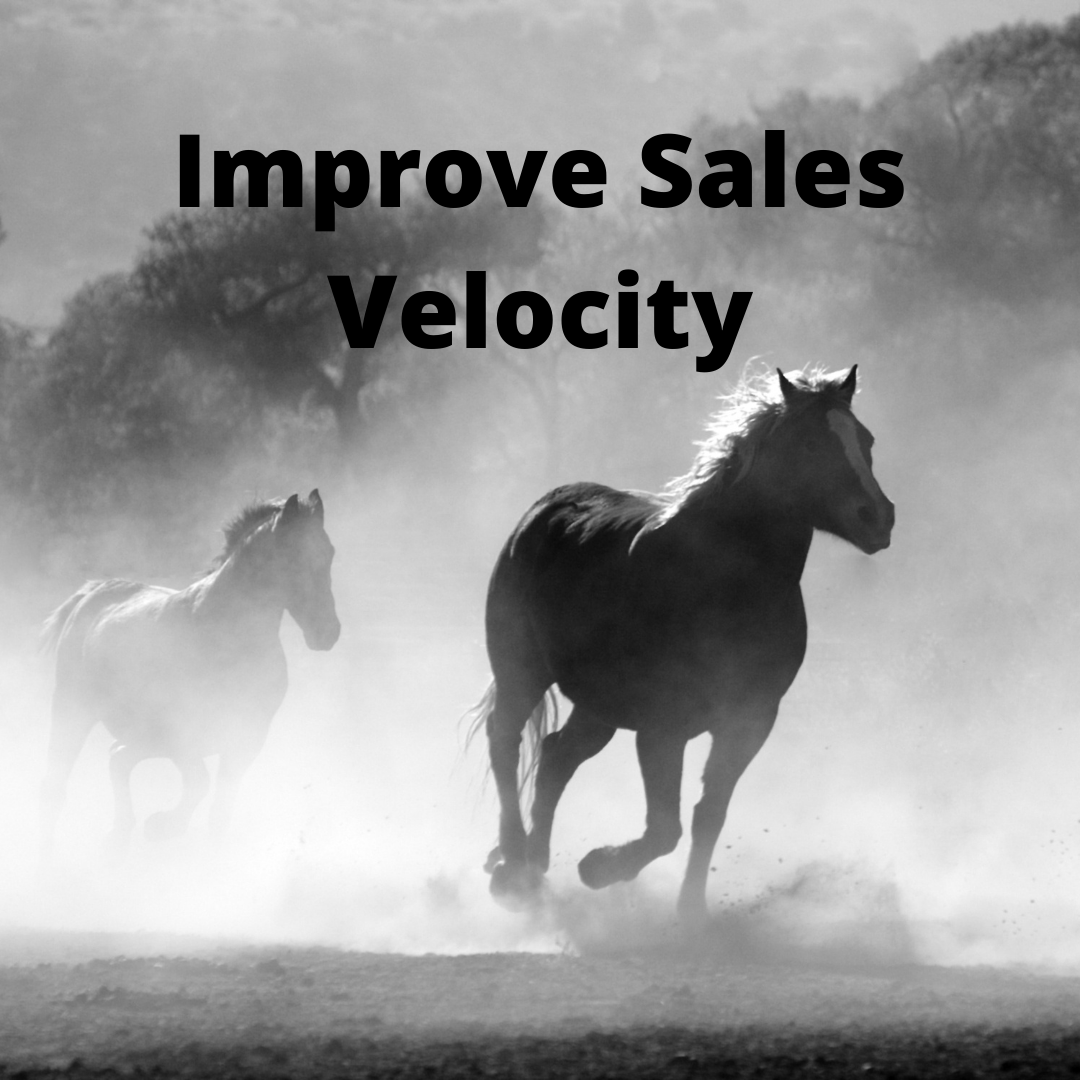

![What is Sales? A Practical Guide [For 2024]](/blog/content/images/2021/02/featured-images.jpg)





